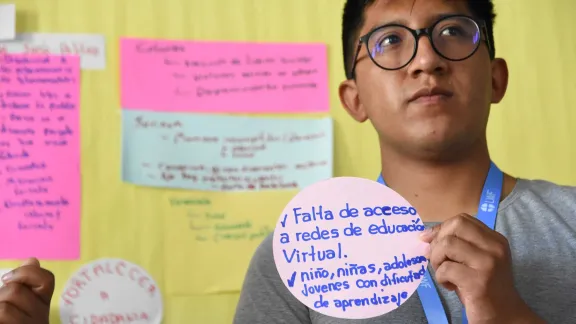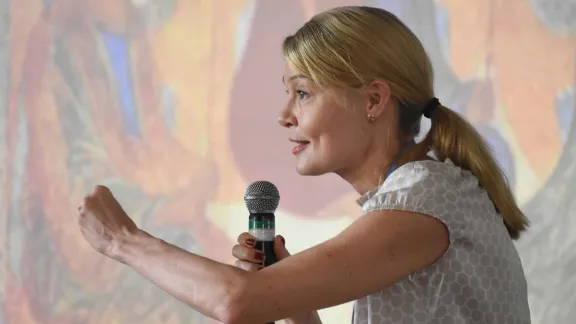Diaconal practitioners from LWF’s member churches in Latin America and the Caribbean address contemporary challenges for Lutheran churches in the region.

Youth participants at the “Sharing the table” workshop in Porto Alegre, Brazil, presented young people’s concerns in the LWF LAC region. Josue Vera Gutierrez, Bolivian Evangelical Lutheran Church, explains the social challenges in Bolivia. Photo: LWF/Eugenio Albrecht
Regional workshop for diaconal practitioners from LAC churches
(LWI) – The church’s call to be diaconal is manifested in its dedicated ministry toward peace and justice rather than in repetitive acts of charity to people in need. Deacon Jonathan Rodriguez de Oliveira, Evangelical Church of the Lutheran Confession in Brazil (IELCB), made these remarks at a regional workshop of The Lutheran World Federation (LWF) member churches in Latin America and the Caribbean (LAC), taking place in Porto Alegre, Brazil.
Rodriguez is one of the 38 diaconal practitioners from 11 LAC churches attending the IECLB-hosted event, 20-24 November, under the theme “Sharing the table.” Participants discussed how diaconal models in the different churches express the biblical concepts of justice and human dignity amid growing inequality and diversity in the region.

Representatives of the Lutheran Church of Peru, explaining how police repression impacts young people. Photo: LWF/Eugenio Albrecht
“Diakonia requires dedication together with sharing bread at the table and communion; it is presented as a ministry about peace and justice," Rodriguez noted in his presentation. "Our repeated actions should not resemble contributions to [commitments] that calm our conscience," he added.
We must ask ourselves if all the people who wish to enter the church can do so through the main door.
Deacon Carla Jandrey, Evangelical Church of the Lutheran Confession in Brazil
Working toward being an inclusive church is part of IECLB’s diaconal witness, which Deacon Carla Jandrey discussed further. When it comes to accessing the church, she said, the tendency is to address only some of the needs, such as how to include people living with disabilities. “But we must ask ourselves if all the people who wish to enter the church can do so through the main door.” Accessibility, she added, must address both physical and attitudinal aspects that exclude people from being in communion. “Is there access for everyone to the altar, or to the cemetery to say goodbye to loved ones?” Churches must integrate such needs in their diaconal work, she noted.

Rev. Sonia Skupch, LWF Regional Secretary for LAC and North America, facilitates a session of the workshop. Photo: LWF/Eugenio Albrecht
LWF Program Executive for Capacity and Leadership Development Rev. Katariina Kiilunen, led the workshop with Rev. Sonia Skupch, Regional Secretary for LAC and North America. Kiilunen described the meeting as “a valuable space not only for creating awareness about the different dimensions of the diaconal task of churches and their organizations, but also opening up debate around difficult themes.”

Rev. Katariina Kiilunen, LWF Program Executive for Capacity and Leadership Development, leads a workshop session. Photo: LWF/Eugenio Albrecht
In group work, participants analyzed the challenges in their communities and the churches’ efforts to promote human dignity and justice in difficult social political contexts. Climate justice emerged as a concern across the region, with participants agreeing on the need to involve children and young people more in activities that promote care for creation. Churches were also challenged to increase advocacy on the link between creation care and alternative modes of production and consumption with regard to food and other material.
In a video message youth participants representing churches in Argentina, Bolivia, Brazil, El Salvador, Honduras, Paraguay and Uruguay expressed what the theme of the workshop implies in their home contexts. “Sharing the table,” they said, means a radical call for inclusion; generating spaces for reflection and intercultural meetings; getting to know the different realities and sharing experiences; giving and receiving love; working with those who have special needs; and pure diakonia.
Kiilunen said the workshop had revealed that diaconal workers in the LAC region work in very challenging circumstances and often feel isolated. “For this reason, the workshop was seen as empowering, a safe place to share concerns and experiences, receive support and learn from others.” Lessons gathered will be shared with church leaders in the LAC Leadership Conference.
Regional diakonia workshop LAC churches – Youth message
In this video message, youth participants at the LWF LAC workshop on diakonia in Porto Alegre, Brazil, give their perspectives on the theme "Sharing the table."


